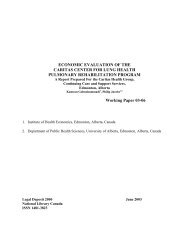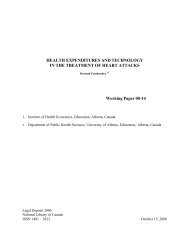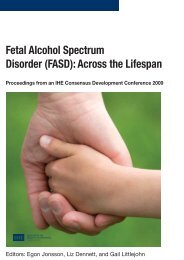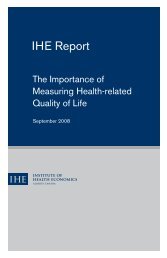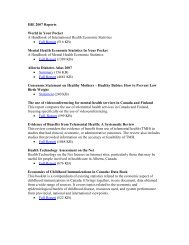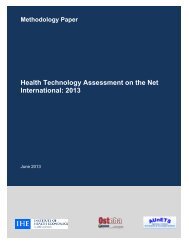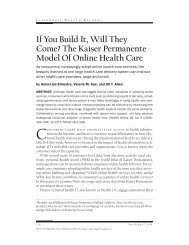Bariatric treatments for adult obesity - Institute of Health Economics
Bariatric treatments for adult obesity - Institute of Health Economics
Bariatric treatments for adult obesity - Institute of Health Economics
- No tags were found...
You also want an ePaper? Increase the reach of your titles
YUMPU automatically turns print PDFs into web optimized ePapers that Google loves.
In the present report, none <strong>of</strong> the included systematic reviews/HTAs specifically reported onpatient motivation and compliance with <strong>treatments</strong>. In the pharmacotherapy studies, patientseventually selected <strong>for</strong> randomization were those who complied with the treatment and lost therequired weight during the run-in phase.Gaps in evidence and future researchA number <strong>of</strong> research gaps and suggestions <strong>for</strong> future research were identified from the includedsystematic reviews/HTAs.GeneralDetermining the optimal duration <strong>of</strong> treatment.Identifying program patterns that are more effective in the long-term.Verifying the reasons <strong>for</strong> dropouts.Including outcomes such as frequency <strong>of</strong> pre-established responses to interventions.Describing the randomization and blinding processes and including intention-to-treatanalyses.Analyzing the effect <strong>of</strong> treatment assignment on health-related quality <strong>of</strong> life, with andwithout adjustment <strong>for</strong> weight change, to determine the true relationships among <strong>obesity</strong>treatment, weight loss, and health-related quality <strong>of</strong> life.Conducting subgroup analyses by age, gender, and initial weight to explore effect sizedifferences. Investigating issues <strong>of</strong> intentionality, type <strong>of</strong> weight loss, and objective measurements <strong>of</strong>weight changes in well-designed prospective studies, to assess the real impact <strong>of</strong> weight losson all-cause mortality in the long-term, <strong>for</strong> overweight/obese populations.Dietary therapy/physical exerciseAdapting lifestyle interventions based on the need <strong>of</strong> each patient population, taking intoconsideration different dietary and physical activity backgrounds. Examining additional outcomes to evaluate possible associations—behavioural andphysiological factors, among others—as well as to explore differences between individualsthat regained weight and those who maintained weight loss.PharmacotherapyConducting longer and more scientifically rigorous studies <strong>of</strong> anti<strong>obesity</strong> drugs that arepowered to examine endpoints such as mortality and cardiovascular morbidity.Determining the long-term effect <strong>of</strong> anti<strong>obesity</strong> drugs on health outcomes.Conducting head-to-head comparisons to determine the relative efficacy <strong>of</strong> different drugs.Examining whether combinations <strong>of</strong> drugs promote greater weight loss than use <strong>of</strong>individual drugs.<strong>Bariatric</strong> <strong>treatments</strong> <strong>for</strong> <strong>adult</strong> <strong>obesity</strong> 97



